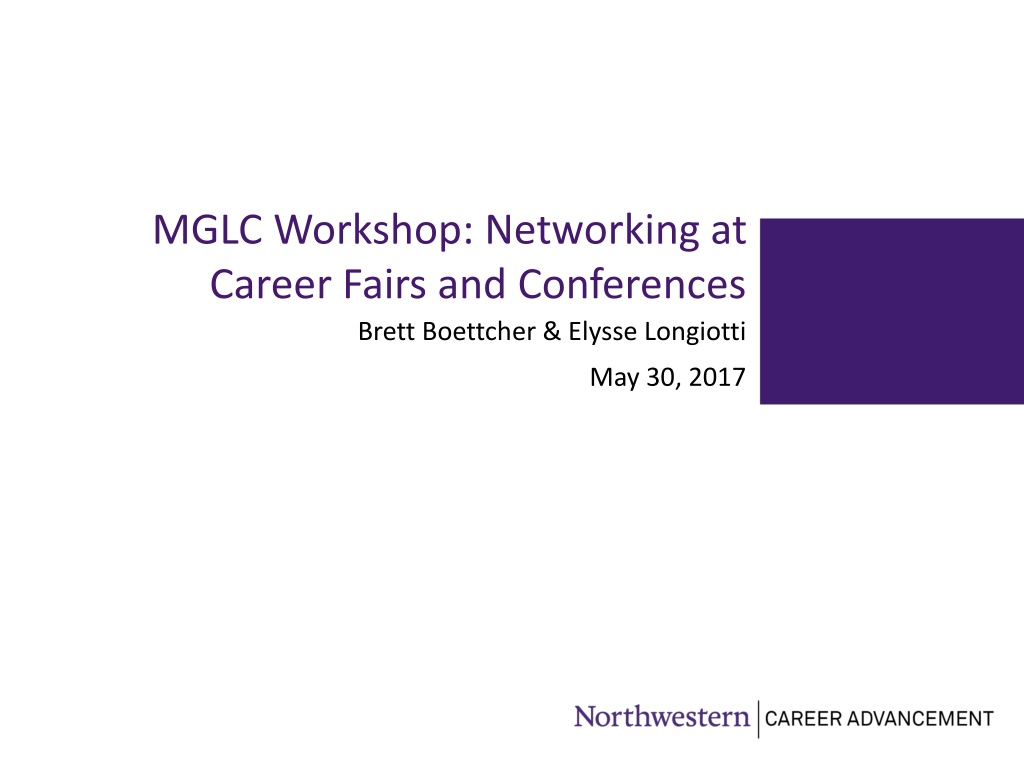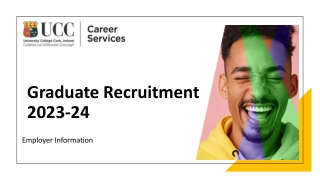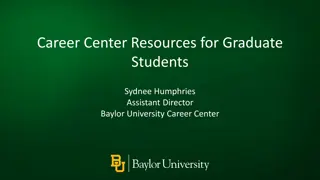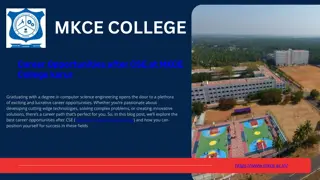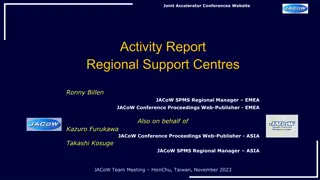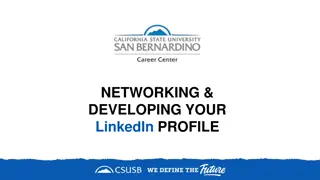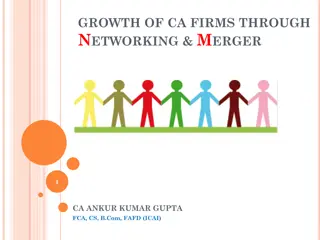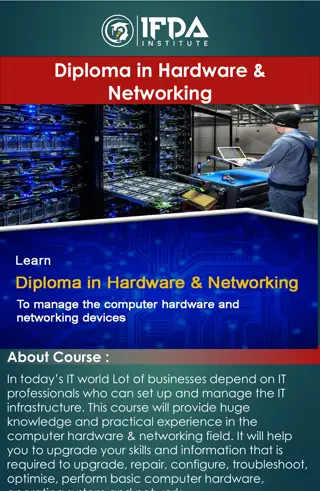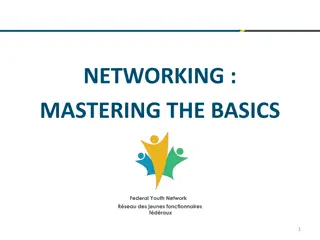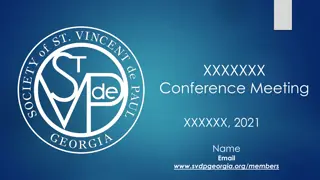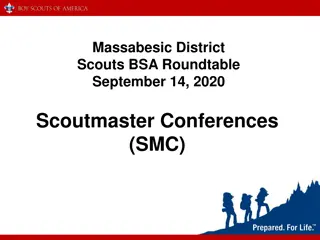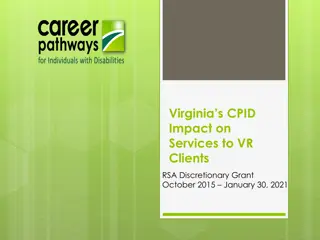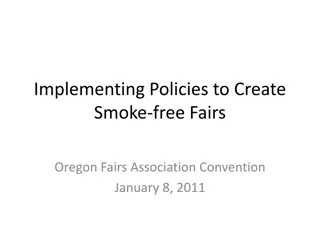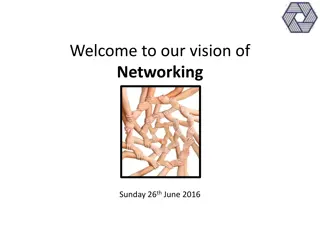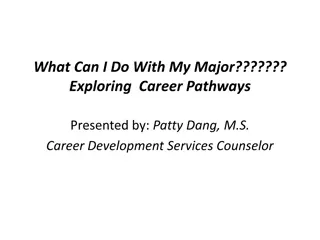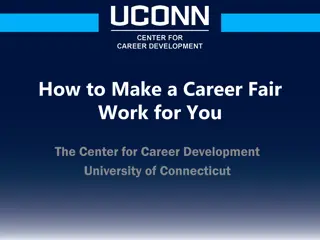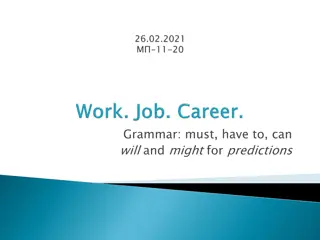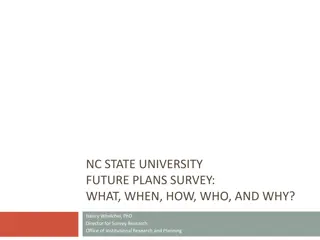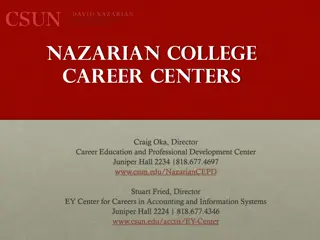Maximizing Networking Opportunities at Career Fairs and Conferences
Enhance your networking skills with practical tips on approaching strangers, asking insightful questions, and making lasting connections at career fairs and conferences. Understand the importance of networking for knowledge sharing, collaboration, and discovering hidden job opportunities. Learn the key differences between conferences and career fairs, and gain valuable tools and tips for effective networking.
Download Presentation

Please find below an Image/Link to download the presentation.
The content on the website is provided AS IS for your information and personal use only. It may not be sold, licensed, or shared on other websites without obtaining consent from the author. Download presentation by click this link. If you encounter any issues during the download, it is possible that the publisher has removed the file from their server.
E N D
Presentation Transcript
MGLC Workshop: Networking at Career Fairs and Conferences Brett Boettcher & Elysse Longiotti May 30, 2017
The Plan Introductions Practice Ending Conversation Approaching a Stranger Networking Skills Asking Questions
Icebreaker 1. Partner with someone you don t know well. 2. In 90 seconds, how many things can you find that you have in common?
Networking "Networking is not the process of reaching out to people. Networking is the process of thinking about whom to reach out to, why, with what goal, and how to do so in a manner that minimizes the negative emotional states that both you and the other person experience and that maximizes the benefit you gain." - Barber, Joseph. "A Networking Rule to Live By," Inside Higher Ed. 22 May 2017. https://www.insidehighered.com/advice/2017/05/22/how-make-job-contacts- want-help-you-essay
Networking Why? Knowledge sharing Collaboration Connections beget connections Hidden job market Where? When? Conferences Formal networking events Career Fair Around NU Everywhere, always
Conference vs. Career Fair Conference Career Fair Industry Professionals, Panelists, Presenters, Moderators, Faculty, Peers Who? Recruiters from companies and organizations Why? Knowledge sharing, collaborations, connections Face time with a recruiter, learn more about specific organizations and positions, set up a conversation/interview Where? During sessions, reception, breaks, the elevator, hallways, volunteering, etc. Specific forum (tables, pre-scheduled interviews, etc)
Tools and Tips Don t just stick with people you already know Be comfortable talking about at least one (appropriate) non-work subject
A comprehensive resource for job search and career management information. Online resource contains: 80+ Downloadable Vault Career Guides and Employer Profiles 3,500+ Company Profiles 1,100+ Vault Career Advice Articles Industry and Occupational Profiles Insider intelligence on salaries, hiring information, and company culture
Wet Feet offers the following resources: Company Profiles on over 1000 companies Company Interviews with leading firms from diverse industries Industry Profiles of over 30 major industries Career Profiles of over 40 careers and functional tracks Real People Profiles on a "day in the life" of dozens of career professionals City and Country Profiles Hundreds of Career Advice Articles offering expert tips and consultation for job seekers
A business research company that maintains a database of over 80 million companies worldwide. Review company and industry profiles and discover trends and new opportunities Find new leads Build a list of companies based on Industry Location Size
Research trends in job titles, key skills, and other keywords Observe hiring cycles
Introducing Yourself Elevator Speech: An audience-specific professional introduction to your interests, experiences, and future plans Develop your 60-second (or less) elevator speech Name and current position How did you get to your current position? For academics, educational history Describe your research for a generalist audience Topic? Why is it interesting and important ( so what )? Define technical terms (e.g., Are you familiar with ____? ) End with questions, next steps
Practice Introducing Yourself Find a partner you don t already know Take turns giving your elevator speeches After each person speaks, listener should provide feedback in the following way Repeat main take-away of research back to the speaker Note when the speaker seemed most engaged Note when the speaker seemed most unsure of her or himself Ask one question
The Art of Conversation Build relationships with strangers by engaging them in conversation Ask thoughtful questions Find areas of commonality Listen
Connections and Questions Who might you speak with at a conference? Industry professionals, panelists, presenters, moderators, faculty, peers (graduate students and postdocs) What kinds of questions would you want to ask at a conference? What s you area of expertise?/Tell me about your research? Where do/did you go to study? Which institution/organization are you affiliated with? What you attended this conference before? What sessions are you planning on attended later? What s the most interest session you ve attended? Are you presenting or on a panel?
Approaching a Stranger or a Group: Fundamental Strategies Smile and make eye contact Say hi Shake hands Enunciate your name When you hear a person s name, repeat it If you forget a name, ask When approaching a group, say excuse me before introducing yourself Begin conversation with your tailored elevator speech or a question
Ending Conversation Whether you have to say goodbye because you are in a hurry or because you feel the conversation has run its course, leaving a positive impression can help you cultivate the possibility of future conversations
Ending Strategies Situation examples: In a hurry I m sorry to interrupt, but I just realized I should leave in order to be at the next session in time. I have to run, but I would like to talk with you further about this would you mind if we connect on LinkedIn? Conversation has dwindled: Well, it was good to meet you and learn a little more about you would you happen to have a business card? I have to excuse myself but I hope to see you at one of the sessions later. It was really a pleasure speaking with you. I m going to take a look at some of the other exhibits (etc), but if I don t run into you later, I hope to see you at another event soon.
Put It All Together Red Group: position yourself around the room in groups and alone Blue Group: approach a person or group and introduce yourself Move around the room and strike up conversation Listen for a cue to end conversation
Additional Resources ECD http://www.mccormick.northwestern.edu/career-development/ NCA Brett Boettcher b-boettcher@northwestern.edu Elysse Longiotti elysse.longiotti@northwestern.edu Career Advising and Counseling by appointment, sign up via CareerCat Express Advising, M-F, 2 4pm, Main Library, 2 North Core
